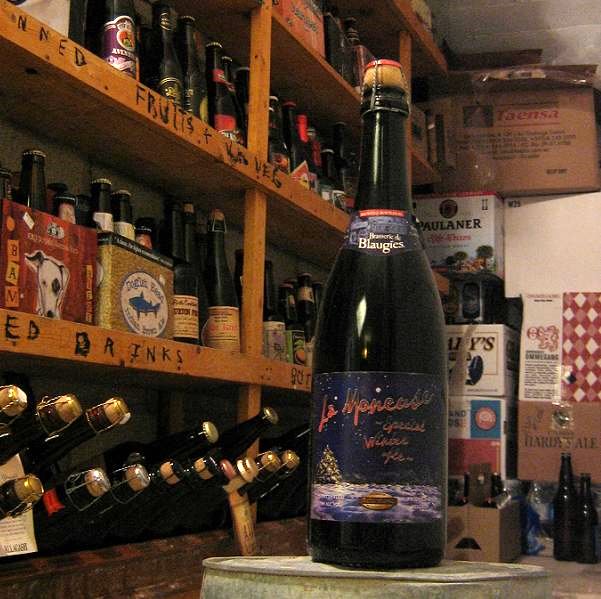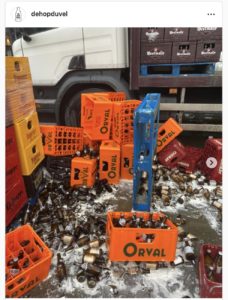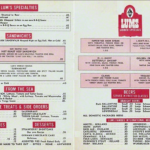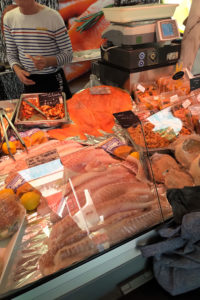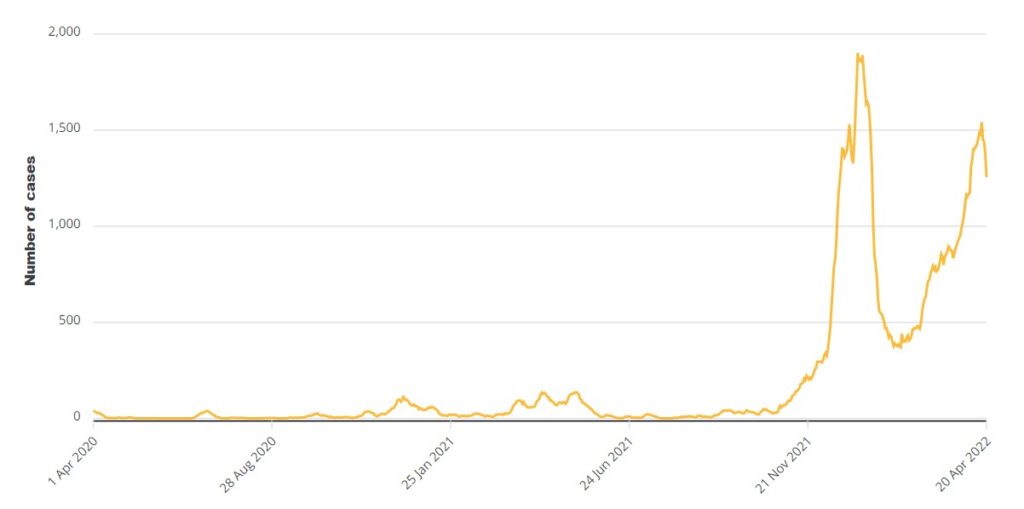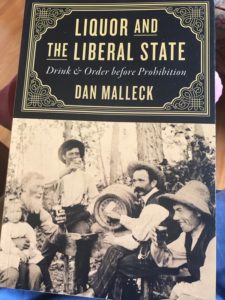 Ah, false spring. I have happily read Dan Malleck’s 2022 book Liquor and the Liberal State: Drink and Order before Prohibition to stay warm this week. It neatly explains the period between the “your betters” of the Georgian status-based mercentile world and modern life, illustrating the rise of the new “your betters” of the regulating bureaucracy through the brief decades in the later 1800s of Canada’s laisse-faire capitalist “your betters”! Perhaps not surprisingly, there is less actual liquor in Dan’s book than in last week’s 2016 update of the bio of Lemmy, White Line Fever* but, to be clear, waaaay more policy debate set in late Victorian Ontario. Lemmy dropped the ball in that respect.
Ah, false spring. I have happily read Dan Malleck’s 2022 book Liquor and the Liberal State: Drink and Order before Prohibition to stay warm this week. It neatly explains the period between the “your betters” of the Georgian status-based mercentile world and modern life, illustrating the rise of the new “your betters” of the regulating bureaucracy through the brief decades in the later 1800s of Canada’s laisse-faire capitalist “your betters”! Perhaps not surprisingly, there is less actual liquor in Dan’s book than in last week’s 2016 update of the bio of Lemmy, White Line Fever* but, to be clear, waaaay more policy debate set in late Victorian Ontario. Lemmy dropped the ball in that respect.
You know, the two books fill handy gaps and together would make for a very interesting compare and contrast sort of essay question given each in its own way is an exploration of autonomy in the modern state. I highly recommend each of them – especially as it’s reasonable to suggest that the lads on the cover of the Dan’s book would, but for the non-invention of a time machine, no doubt would have picked up a fond affection for Motörhead. Especially that lad to the right. I might have post a full review of the book but (i) it is not 2008-14 and not one does that anymore and (ii) Dan warned me off:
Enjoy. If you don’t, I don’t wanna know 🙂
Get both books. Do it! Note: UBC Press’s online shopping is particularly handy.
Speaking of the song stylings of Motörhead, this week’s piece in the Pellicle about hearing loss is something worth reading. I fried my ears on cheap RadioShack headphones and late 70s punk as a kid, leaving myself now with tinitus, lost accuity leading me to say “what?!?!” a lot as well as pain from a whole range of sounds now. I actually had to flee a pub this year when the Irish band struck up. Hot knives in the head. Anyway, it’s real and if you don’t believe me, think about what Emmie Harrison-West says about it:
…there’s no such thing as a ‘quiet pint’. I struggle if I sit at the bar, or next to barking dogs (which is torture, I tell you—being a lover of all four-legged friends), speakers, toilets, televisions, fruit machines, pool tables, and kitchens, as I have to strain to hear my friends, or ask them to repeat themselves. It’s as frustrating as it is exhausting. There’s only so many times I can say: “Sorry, what?” before I end up closing in on myself, smiling and nodding, becoming reserved, and making an excuse to leave.
There is a good descriptor for NA beer: a soft drink. I don’t care to write about them but others seem to need to include them in with, you know, actual drinks. Big in Germany, says Will Hawkes in VinePair:
It was introduced in 2018 after Reineke spent two years developing the beer. “All my brewer friends told me that it was a stupid idea, that nobody would want it in Germany,” he says. “But it’s getting more and more popular and I think it’ll be our No. 1 product within the next few years.”
Along a similar line of things not being what they suggest they are, are wet led pubs really taking off in the UK? The Mudge doubts it – and considers it in the context of his local where he has seen kitchen food service come and now go:
There was a serving hatch in the extension from which a variety of straightforward food was dispensed at lunchtimes. I remember having some tasty bacon barms there. But the general decline of pubgoing meant that it became nowhere near as busy as it once was… They introduced a much more ambitious and expensive pub food menu, but it never seemed to find many takers, and the general impression that the pub still gave of being a traditional boozer probably put diners off. In hindsight, it might have made more sense to make the extension a dedicated dining area with a brighter colour scheme and return the main bar service to the old side. So the food has now been dropped, and according to WhatPub it now only offers “pies and barmcakes”, which presumably need no kitchen preparation.
Similarly on the theme of what is is not what is said to be, The Tand Himself has taken his study of Sam Smith’s pub chain’s flaunted nanny alt-state rules… and found them utterly flouted in The Big City:
While it has never been officially confirmed, it is known that Humphrey’s son Sam is the supremo of all the Southern operations. Things are done differently there, and while recently in the North, innovations such as paying by phone and card have been accepted, it is true to say that no such restrictions have operated in London for quite some time.The reasons for this are pretty obvious when you look at the clientele. I think it’s fair to say that in the absence of paying by card or phone Mr. Smith would find insufficient customers willing to pay by cash, as payment by such is, in London, the exception rather than the rule. Also missing from most of the London pubs is the plethora of notices forbidding this, that or the other, though it is fair to say that the one prohibiting electronic devices is generally clear and present, but, particularly in the case of phones, is blatantly and wholly disregarded.
Heavens! Speaking of which, The Guardian reports that Trappist breweries are suffering from a definite lack of Trappists. As a Protestant I can only say, theologically-speaking, it’s about time. But will we miss them when they are gone?
…uncertainties hover over the future of Trappist beer production in this traditionally Catholic country, where fewer people are drawn to a life of monastic contemplation. Those questions became more acute in January when Belgium’s Achel beer lost its Trappist status after being taken over by a private entrepreneur. The new owner has vowed to keep the recipe unchanged, but after the severing of ties with monks, Achel can no longer call itself a Trappist beer. “It must be admitted that the state of most monastic communities is precarious,” said Brother Benedikt, the abbot of Westmalle…
Furtherly similarly but from the wholey unholier point of view, will Boston Beer finally complete its BA Denied™ slow full rotation from micro to craft to something else to none of the above by selling itself off:
After riding high on the hard seltzer boom in the run up to the coronavirus, Boston and its shares fell from grace when it almost bet the ranch and lost on its Truly brand only to see demand hit the brakes leaving it to write off huge amounts of stock… Heineken is running its eye over Boston because the existing market positions of brands such as Truly and Twisted Tea could fill a strategic hole in the armoury of the world’s third largest brewer. While she does not believe a deal is imminent, she says such a move holds “strategic rationale for both parties.”
Does all this leave you less than… enthused? Does beer leave you feeling like Wojciech Weiss or even Walter Richard Sickert observed? Is there any doubt it’s been losing fans for very good reasons? Ron wants to know and even shares a confession:
I rarely join the chase foe a specific beer nowadays. Unless it’s something really special. And by special, I mean odd, forgotten and obscure styles. Not the latest trend. I can take or leave the newest type of IPA or adulterated Imperial Stout. My interest has now mostly shifted to history. Understanding how beer styles are formed and mutate as they spread out from their initial homelands. I put in as much time and effort as ever, Just in a different environment. No longer out in the field with my binoculars hoping to spot a rare bird to cross off my list. But at my computer, excavating the barrows of long-lost brews. Without enthusiasm, I wouldn’t be doing this work.
Ontario wine writer Michael Pinkus shared another sort of lack of enthusiasm in his monthly newsletters, the provincial monopoly’s moves to limit local drinks writers:
In 2019 the LCBO started to curate the wines that they were allowing journalists to taste. They were dictating to the local media what they should be covering. When I pressed the LCBO for an explanation nothing was provided. (Did money play a part?). And now, no local, independent journalist tastes any kind of extensive line-up of LCBO wines. So how do you really know what’s good and fits the Ontario palate? Today the LCBO saves even more money by “borrowing” notes from international journalists to sell the wines on their shelves; how does that benefit their ultimate consumer? Ontarians. What I find even more offensive is of late they use their own product consultants as “experts” to review wines.
Finally, some legal news. The Supreme Court of Canada ruled this week in a case of the often seen situation of a drunk guy on an ATV bombing along a back road… with a twist:
… a non‑exhaustive definition does not necessarily oust other definitions. Depending on the context, exhaustive and non-exhaustive definitions can be read together. Under a harmonious reading of the two definitions of “driver”, for the purpose of s. 48(1), “driver” refers to a person who is driving, or has care or control of, a motor vehicle on a highway. A person who has care or control of a motor vehicle but who is no longer on a highway would not be a “driver” under the HTA. In the present case, Mr. McColman was not a “driver” for the purpose of s. 48(1) when he was stopped by the police. Even if it can be said that he had care or control of the ATV, he was not on a highway when the police effected the stop. Therefore, the police stop was unauthorized by s. 48(1) of the HTA.
See, the guy was stopped after he left the road and was on private property. Fortunately, the Court let the evidence in even though there was a violation of ATV guy’s rights holding that society’s interest in the truth-seeking function of the criminal trial process would be better served by admission of the evidence even though the police impacted Mr. McColman’s liberty interests when they the police questioned him in the course of an unlawful detention. Sucks, as they say, to suck.
There. Done. Enough. Finis. Consider Mastodon. Here’s your newbie cheat sheet:
Stan Hieronymus | The Man!
Boak & Bailey | The B² experience
Katie Mather | Shiny Biscuit and Corto
David Jesudason | “Desi Pubs” (2023) author
Ron Pattinson | The RonAlongAThon Himself
Al Reece AKA Velky Al | Fuggled
Jennifer Jordan | US hops historian
Alan McLeod | A Good Beer Blog (… me…)
Andreas Krennmair | Vienna beer and lager historian
Beer Ladies Podcast | Lisa Grimm and colleagues
Jay Brooks | Brookston Beer Bulletin
Joe Stange | Belgian beer expert, beer magazine editor
Cider Bar | Barry makes Kertelreiter cider
Laura Hadland | CAMRA historian and beer writer
Brian Alberts | US beer historian
Jon Abernathy | The Beer Site
Maureen Ogle | US Beer Historian
Lars Garshol | Norwegian Beer Historian and Kveik Hunter
James Beeson | Beeson on Beer
Carla Jean | MAINER!!!
Thandi Guilherme | Beer Ladies Podcast Co-host
Lisa Grimm | Beer Ladies Podcast Co-host
Rob Talksbeer | Podcaster and Youtuber
Anthony Gladman | UK Drinks Writer
Jeff Alworth | Manna Of Beervana
Northwest Beer Guide | Fairly self explanatory… but not NW Latvia…
Evan Rail | Prague based GBH editor, freelance writer, NYT etc.
Todd Alström | 50% of the Alströms
Jacob Berg | Beer talking librarian
Anyone else? And check the blogs, podcasts and newsletters including more weekly recommendations from Boak and Bailey every Saturday and maybe from Stan at his spot on those Mondays but, you know, he writes bits and bobs when he can… like this! Get your emailed issue of Episodes of my Pub Life by David Jesudason every Friday. Once a month, WIll Hawkes issues his London Beer City newsletter and do sign up for Katie’s wonderful newsletter, The Gulp, too. Ben’s Beer and Badword is back! And check out the Atlantic Canada Beer Blog‘s weekly roundup. There is new reading at The Glass. Any more? Yes! Check to see the highly recommended Beer Ladies Podcast. And the long standing Beervana podcast . There is the Boys Are From Märzen podcast too and check out the travel vids at Ontario’s own A Quick Beer. There is more from DaftAboutCraft‘s podcast, too. Still gearing up, the recently revived All About Beer has introduced a podcast, too even if it’s a bit trade. There’s also The Perfect Pour. Plus follow the venerable Full Pint podcast. And the Craft Beer Channel this week on Youtube. And remember BeerEdge, too, and The Moon Under Water… if you have $10 a month for this sort of thing… I don’t. Pete Brown’s costs a fifth of that. There was also the Beer O’clock Show but that was gone after a ten year run but returned renewed and here is the link!**
*Though neither than compare to Ron’s notes from the road.
**And finally the list of the departed newsletters and podcasts or those in purgatory. Looks like both Brewsround and Cabin Fever died in 2020, . We appreciate that the OCBG Podcast is on a very quiet schedule these days – but it’s been there now and again. The Fizz died in 2019. Ben has had his own podcast, Beer and Badword (Ed.: …notice of revival of which has been given… still not on the radio dial…) Plus Fermentation Radio with Emma Inch seems done and the AfroBeerChick podcast is gone as well! The Fingers Podcast packed it in citing, umm, lack of success… as might have been anticipated, honestly. Did they suffer a common fate? Who knows?

